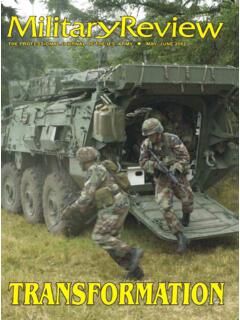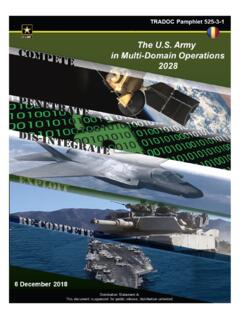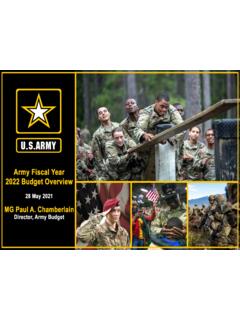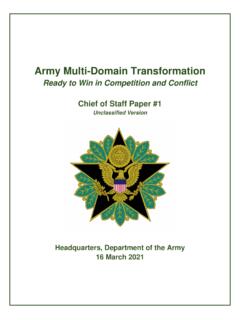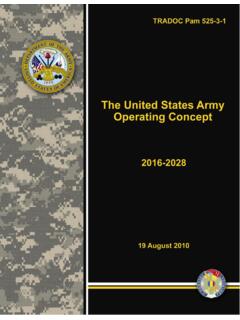Transcription of Improving Leader Development in the Operational Domain
1 IMAGINE HAVING TO CHOOSE a surgeon out of three available to perform a much-needed procedure. The first surgeon just completed medical school but has not per-formed a surgical procedure since graduation. The second has performed many procedures illegally but has never completed medical school. The third has completed medical school and performed several procedures over ten years ago but has not practiced medicine since. If you are thinking what I am thinking, the search is not over; a qualified surgeon has at-tended medical school, performed surgical procedures, and continued to improve his or her craft. This analogy illustrates the significance of each of the army s three learning domains to effective Leader Development (see figure).1 To become effective leaders, individuals need developmental activities in the institutional Domain , the Operational Domain , and the self- Development Domain . Improving Leader Development in the Operational DomainLt. Col. Kevin M. Kreie, ArmyLt.
2 Col. Kevin M. Kreie is the Leader Development specialist for the army s multi -Source Assessment and Feedback program, Center for army Leadership, Fort Leavenworth, Kan. He holds a in criminal justice and an in theology. His deployments include Operations Desert Shield/Desert Storm and Iraqi Freedom.( army )62 March-April 2014 MILITARY REVIEWThe army Leader Development model shows experience, education, and training in each learning Domain , with overlap between the domains. Leader Development activities in the institutional Domain tend to occur in schools and courses. Activities in the Operational Domain tend to occur in duty assignments. Activities in the self- Development Domain tend to consist of activities selected and performed by individuals. Few would disagree that army leaders need to build a solid foundation of leadership training, typically in the institutional Domain ; they need to apply that training, typically in the Operational Domain ; and they need to con-tinue maintaining and Improving on it, typically in the self- Development Domain .
3 army Leader Development activities in the institutional and self- Development domains are, for the most part, effec-tive. The army as an institution generally ensures soldiers participate in institutional Leader devel-opment activities. Individual soldiers commonly exercise initiative to ensure their participation in self- Development activities. However, the army has shortfalls in Leader Development activities in the Operational Domain . Effective Leader Development in the Operational Domain depends on unit leaders taking the time to provide individualized counsel-ing, coaching, and mentoring to their subordinates. The Institutional DomainLeader Development in the institutional Domain , through programs such as professional military education and the Civilian Education System, gives individuals a foundation of leadership capabilities. These courses are designed to provide knowledge and skills deemed necessary for success at a par-ticular professional level.
4 As the army Leader Operational DomainInstitutional DomainLeader DevelopmentTrainingExperienceEducationEd ucationExperienceTrainingArmy Capstone ConceptSelf- Development DomainExperienceEducationTrainingEducati onTrainingExperienceThe army Leader Development model63 MILITARY REVIEW March-April 2014 Operational Leader DEVELOPMENTD evelopment Strategy 2013 states, Every program of instruction in our officer and NCO Development programs has been updated to account for the les-sons of the past 12 years while also looking forward to the requirements of tomorrow. 2 This is why it is ideal for leaders to complete these courses at the beginning of each career level. The courses also ensure leaders in each cohort build a similar foun-dation that helps them perform in various positions across a particular field. Additionally, attending courses gives leaders an opportunity to take a step things that we are seeing we need to add back in. 3 This correction, however, is an easy fix.
5 Unlike issues in the Operational Domain , the issues in the institutional Domain are relatively simple to change. Yet, while activities in the institutional Domain are highly valuable and effective, this Domain is not enough by Operational DomainIt is imperative for Leader Development to occur in the Operational Domain , where leaders are assigned to perform Operational duties. Leaders cannot cease their Development at school graduations and then continue again at the next school, years later. Learning in the institutional Domain needs to be perfected and built upon in the Operational Domain . The responsibility to make Leader Development activities continue in the Operational Domain falls on unit-level leaders. Unit leaders must develop their subordinates. As the army Leader Develop-ment Strategy 2013 states, If today s leaders do not adequately develop their subordinates through personal example, counseling, and mentorship, then today s leaders have not succeeded in accomplish-ing tomorrow s mission.
6 4 Within the Operational Domain , Development focuses more closely on the soldier s specific duty position, unlike the institu-tional Domain , in which Development focuses more on a general foundation that applies across multiple positions within a career field. The serious shortfall of Leader Development within the Operational Domain has implications for future generations of soldiers. Like the curtailing of courses due to Operational requirements, Leader Development was minimized, if not lost, in much of the Operational Domain . I am not saying that Leader Development was not happening in the Operational Domain , nor am I saying no leaders were developing their subordinates. However, while Leader devel-opment was occurring to some extent, it was not occurring up to par and as much as needed. As the 2012 Center for army Leadership Annual Survey of army Leadership (CASAL) stated, army Leader effectiveness in the competency Develops Others continues to be the lowest rated, and the most in need of attention.
7 5 As exceptional as leaders have been during the past 12 or 13 years of conflict, unit leaders simply have not had enough time to conduct Leader Development properly in the Operational The serious shortfall of Leader Development within the opera-tional Domain has implications for future generations of soldiers. back from Operational requirements and dedicate time solely to the process of learning, reflecting on their past performance in the Operational field, and making changes they need for future success. The army does not have any serious problems of Leader Development within the institutional Domain . Since there are forcing mechanisms or standards in practical exercises and tests that one must pass in order to graduate, when leaders complete any course, there is little doubt they will learn the minimum requirements. It is true, however, that not all students leave a certain course with the same knowledge. For example, in the Command and General Staff College, majors can participate in extracurricular activities such as completing the masters program or participating in various academic competitions.
8 Many participate and gain additional knowledge, but many do not. Even those who only learn the bare minimum will leave the course with a significant amount of knowledge when they graduate. Now, due to the demands of recent conflicts, some courses have been curtailed. Sgt. Maj. of the army Raymond F. Chandler III stated in reference to courses that were reduced to accommodate the deployment cycle, We know we ve cut a lot of 64 March-April 2014 MILITARY REVIEW Domain because of mission requirements. However, unlike the institutional Domain , correcting this is not an easy fix. Because Leader Development in the Operational Domain has been minimized, there are majors, chief warrant officers, sergeants first class, and below who joined the ranks after 9/11 and have not been developed properly. They in turn, may not understand the need to develop their subordinates, or they may not know how. Likewise, those who served before 9/11 with knowledge of how to develop others are starting to leave the ranks and retire.
9 army leaders need to take prompt action to ensure Leader Development occurs within their organizations and to ensure their subordinate leaders are develop-ing others, especially in the Operational Domain . As the army Leader Development Strategy 2013 states, Senior leaders must hold subordinate leaders accountable for Leader Development and reward those who take this to heart. 6 Moreover, Leader develop-ment is not complicated. ADRP 6-22, army Leader -ship, states, Leaders have three principal ways of developing others. They can provide knowledge and feedback through counseling, coaching, and mentor-ing. 7 In other words, leaders pass their knowledge to others to individuals so that individual soldiers and army civilians become even better leaders. It is true that some Leader Development in the Operational Domain occurs through activities such as real-world missions and training exercises, but unless individual leaders provide individualized counseling, coaching, and mentoring, Leader devel-opment is not what it could and should be.
10 One can only learn so much without receiving personal and specific feedback. For example, I originally wrote this article to the best of my ability, until I could no longer improve it. When others, more experienced and capable than I, took the time to review my work and provide feedback, I was able to improve it. A similar process occurs with leaders. They can perform a mission repeatedly, but unless a counselor, coach, or mentor observes and provides feedback, the amount of improvement will be minimal. The main resource the higher Leader needs to develop subordinates is time the time it takes to talk to an individual and share knowledge. The process can be beneficial to both parties. army leaders can combine a variety of approaches to facilitate developing others, but all depend on army Gen. Raymond T. Odierno, the chief of staff of the army , speaks during the army War College class of 2013 graduation ceremony at Carlisle Barracks in Carlisle, Pa.
